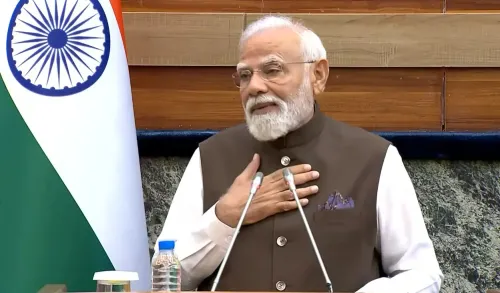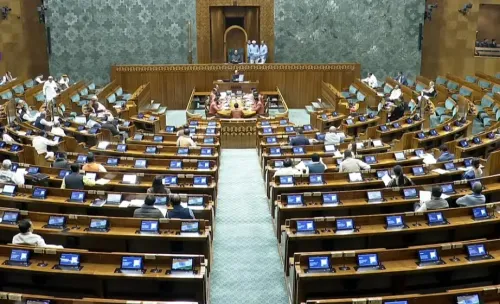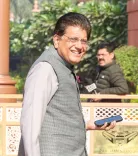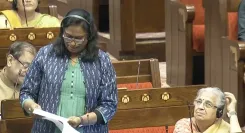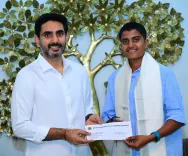How is India's Spirituality Thriving Under PM Modi?
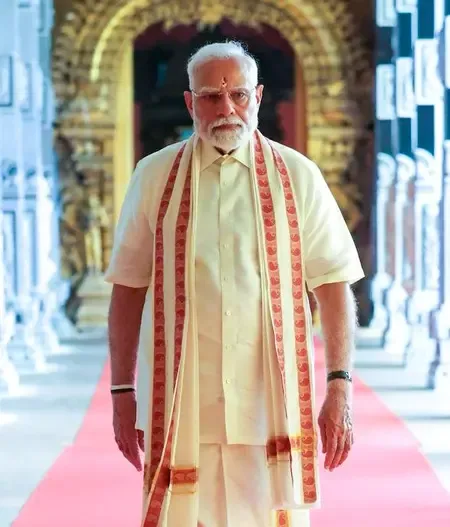
Synopsis
Key Takeaways
- India's cultural renaissance blends ancient roots with modernity.
- Transformative projects enhance spiritual tourism and accessibility.
- Inclusivity is central to India's cultural and spiritual initiatives.
- Ayurveda and Yoga are gaining global recognition as wellness practices.
- UNESCO World Heritage Sites bolster India's cultural legacy.
New Delhi, June 2 (NationPress) "We must keep our culture, civilisation and values alive, preserve and enhance our spirituality and diversity, while continuously modernising technology, infrastructure, education and health systems." This vision articulated by Prime Minister Narendra Modi has become a fundamental aspect of India's cultural and civilizational renaissance over the past 11 years.
Through his transformative leadership, India has successfully reconnected with its ancient spiritual foundations while simultaneously modernising the avenues through which these roots are experienced—thanks to improved infrastructure, the restoration of historic monuments, and a commitment to global cultural diplomacy. The outcome is a vibrant reawakening of Bharat’s essence, which is both timeless and forward-looking.
Under PM Modi’s guidance, India has experienced a profound cultural transformation that transcends mere revival; it embodies a renaissance that fuses deep civilizational pride with the vibrancy of a contemporary nation. This cultural resurgence is a hallmark of the Modi era, evident in efforts ranging from the restoration of ancient temples and the preservation of spiritual traditions to reimagining cultural infrastructure and reviving the legacies of forgotten heroes.
Reclaiming Civilizational Roots
India’s cultural revival is anchored in ambitious projects that reconnect individuals with their spiritual heritage. Initiatives such as the Kashi Vishwanath Corridor, the Mahakaal Lok Project, and the inauguration of the Ram Mandir in Ayodhya have redefined the pilgrimage experience, merging spiritual sanctity with world-class amenities. These projects demonstrate the government’s commitment to safeguarding sacred sites while enhancing accessibility and comfort.
From Kedarnath to Kamakhya and the reconstruction of the Juna Somnath Temple to the development of the Parvati Mandir promenade, these initiatives have rejuvenated once-forgotten heritage sites, elevating them back into the national consciousness.
Boosting Pilgrimage and Connectivity
Infrastructure advancements like the Char Dham Highway Project and the approved Hemkund Sahib Ropeway have fortified pilgrimage connectivity. Additionally, a focus on circuits such as the Buddhist Circuit and the Kartarpur Sahib Corridor underscores India’s commitment to inclusive spiritual tourism. These initiatives are not solely about preserving faith; they stimulate local economies, promote tourism, and weave together India’s cultural fabric across states and borders.
Inclusive Heritage Development
India’s spiritual mosaic embraces all faiths, and the government has celebrated this diversity through initiatives like the PRASAD—Pilgrimage Rejuvenation And Spiritual Augmentation Drive—which has revitalised key places of worship across various religions. Over Rs 1,900 crore has been invested in these initiatives, while the Swadesh Darshan scheme has allocated upwards of Rs 5,000 crore for projects that enhance spiritual tourism. Complementing these efforts, the HRIDAY scheme has modernised 12 heritage cities.
This integrated development is reshaping how both Indians and the global community experience the nation’s spiritual and cultural heritage.
Repatriation of Lost Heritage
Restoring pride also entails reclaiming lost artifacts. Prior to 2013, only 13 stolen antiquities had been returned to India. However, since 2014, 642 antiquities have been traced and many have returned, including 578 from the United States—a record for any nation. These efforts exemplify India's global influence and resolve to reclaim its heritage.
Celebrating Unsung Heroes
From the Azadi Ka Amrit Mahotsav to the establishment of statues, museums, and memorials, India is rediscovering its true nation-builders. Initiatives like the National War Memorial, National Police Memorial, and the Pradhan Mantri Sangrahalaya pay tribute to heroes from diverse backgrounds, transcending political boundaries.
The newly inaugurated New Parliament House, featuring its Sengol and Constitution Hall, embodies India's spiritual values and democratic heritage. Structures like the Bharat Mandapam, with the world’s tallest Nataraja statue, reflect India’s position as a civilizational power.
Strengthening Unity in Diversity
Programs such as ‘Ek Bharat Shreshtha Bharat’ and events like the Kashi Tamil Sangamam highlight India’s living unity. From Guru Parvs to the Global Buddhist Summit, and the Mahakumbh 2025—which attracted over 66 crore devotees—to the Waqf (Amendment) Act, 2025, India is actively reinforcing its spiritual and cultural cohesion.
WAVES 2025: Cultural Diplomacy in Action
The World Audio Visual Entertainment Summit (WAVES 2025), launched by PM Modi in Mumbai, positioned India as a global creative giant. With delegates from over 100 countries and MoUs valued at over Rs 8,000 crore, WAVES accentuated India’s cultural leadership in the digital age.
Yoga and Ayurveda: India’s Gifts to the World
Yoga continues to unite the globe. From over 35,000 participants practicing Yoga on Rajpath in 2015 to 23 crore participants in 2023, the International Day of Yoga has evolved into a worldwide phenomenon. The 2025 theme—‘Yoga for One Earth, One Health’—conveys a universal message.
Meanwhile, Ayurveda is establishing India as a hub for holistic wellness. With 24 international MoUs, Ayush visas, and recognition from the WHO, India’s ancient healing practices are gaining international trust. The Ayurveda Day 2024, celebrated in 150 countries, further highlighted this growing influence.
UNESCO Recognition: Preserving Cultural Icons
India now boasts 43 UNESCO World Heritage Sites, with an additional 62 on the tentative list. The recent inclusion of the Moidams of the Ahom Dynasty from Assam enhances India’s global cultural standing. Each site serves as a gateway to the past and a promise for the future.
A Cultural Revolution for the Future
India’s civilizational journey is not merely being preserved; it is being revitalised with vision and vigor. As temples are restored, heroes are remembered, and traditions are celebrated, the country stands tall as both an ancient civilization and a modern power. With enhanced infrastructure, spiritual vibrancy, and cultural pride, India is presenting its identity to the world—not as a relic of the past, but as a beacon of timeless wisdom and forward-looking strength.



